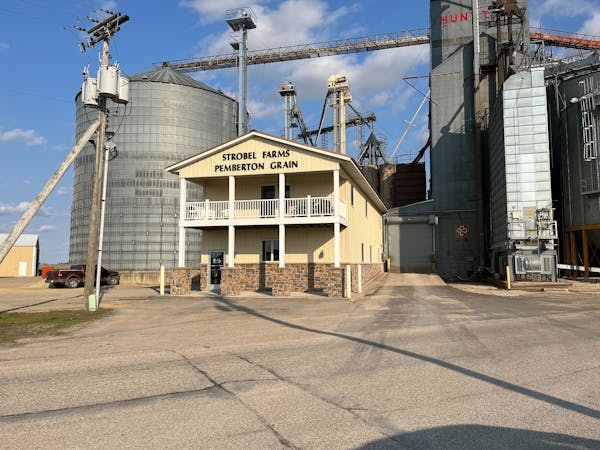WINDOM, Minn. — Inside a garage with the doors flung open, Javier Jimenez drops onions and peppers onto his propane gas grill.
As he carves slices of pineapple-marinated pork from the hunk of al pastor, Jimenez laments the fates of workers from Mexico — many of them his customers — who will have 10 days to return home after the HyLife slaughterhouse on the edge of town closes Friday.
"A lot of them are getting to that desperation stage," Jimenez said, speaking over sizzling meat. "About 50% are going to scatter."
Jimenez used to work at the pork plant himself. He now works four 10-hour shifts at a nearby ethanol plant, but takes off Fridays with his fiancé, Erica Flores, to sell tacos from their home.
In early April, Manitoba-based HyLife announced plans to shutter the Windom plant on June 2. Days later, the plant filed for bankruptcy.
At a bankruptcy hearing in Delaware on April 28, U.S. District Judge Thomas Horan approved the company's plan to pay employees $1.7 million, calling them "the lifeblood of the company." In St. Paul, legislators just wrapped up session with a bill to send Windom $14 million to stymie the damage left in HyLife's wake, aiding a sewer, a school and a housing complex on the edge of town with unfinished homes that are wrapped in Tyvek.
Of the 1,000-plus workers, nearly half are immigrants. For those on H-2B visas — temporary work permits for noncitizens — the choices are limited. Return to their home of Guanajuato in central Mexico where they may face violence or debts they'd hoped to pay off with three years working good-paying U.S. jobs? Or find another company in the United States to accept a work transfer?
Last Friday morning at Jimenez's garage, the first customer, wearing a Vikings cap and Minnesota Loons T-shirt, ordered a quesadilla. He works at the HyLife plant, but said he found a new job in Michigan.
HyLife brought him and many others to Windom on three-year contracts. Employees from Mexico made financial decisions based on that guaranteed work. "They killed all our hopes," he said. He is being granted anonymity because he fears retribution.
Now, he said, he feels like he's living "from one moment to the next."
Guest worker programs trace their roots through the 1940s, when farm workers from Mexico arrived in California. Sometimes called "low-skilled labor," the modern H-2 program has offered visas for temporary workers — the H-2Bs — since the late 1980s, enabling American employers to keep businesses from hotels to slaughterhouses operating.
Many workers at HyLife, who spoke with the Star Tribune May 26, said the company's program offered them a legal opportunity to make real money in the U.S.
Many have lived at a reconverted hotel in Mankato — an hour up the road. Others stay at a former motel in Windom. HyLife pays their rent and transportation to work. But according to a message to workers obtained by the Star Tribune, the Manitoba-based pork giant will transport workers back to Mexico in early June.
The about-face has left the town reeling.
"They are in crisis," said Gabby Nelson, a health strategist. Nelson works with a local aid group and organized a food drive in May for the workers. "We don't just need people to work here, we need them to thrive here."
Windom was plotted by the railroad and named for William Windom, a U.S. senator and President James Garfield's secretary of the treasury. Today, it's the seat of Cottonwood County. Old grain elevators tower like country skyscrapers. Locals remember the previous owners of the slaughterhouse on the edge of town, like generations of high school athletes.
Across the street from Jimenez's garage, neighbor Gwen Armstrong sits with her legs folded, reading the newspaper. Her husband, now deceased, was the town barber and cut the hair of workers under one of the plant's previous ownership.
"It's sad," Armstrong said. "You hear rumors. And then you think, 'That changes so many people's lives.'"
On the Friday before Memorial Day, plant workers crowd around a picnic table as the shift change brings more workers to the taco garage on this residential street. The visa-holders — who also said they were afraid of retribution from their employers — told the Star Tribune that the company promised them 80 hours of work every two weeks.
In August, shifts declined to 65 hours every two weeks and the line speed quickened, workers say.
According to documents filed in bankruptcy court, HyLife in August hired PricewaterhouseCoopers, a London-based firm, to find a buyer for the plant. It was losing $6 million a month.
This news surprised the workers. Some said they were told the work hours were reduced because the pigs were sick.
In Jimenez's garage, his skillet slaps the grill surface. He wonders if Friday is his final day for the tacos.
"When HyLife came, they had their own philosophies and ways," Jimenez said. "It was a complete failure."
Flores hands out take-home bags of tacos to workers. She pours them glasses of horchata underneath a giant blue-and-yellow flag for a Mexico City soccer club as another truck full of workers arrives to grab what everyone agrees — at least for another week — are the best tacos in town.

Justice Department sues to block UnitedHealth's $3.3 billion deal to acquire Amedisys

Apple headphones can work as hearing aids. Minnesota-based Starkey says it welcomes competition.

Bremer Bank reportedly for sale, months after settling long dispute with Otto Bremer Trust

